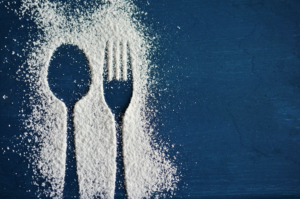By Emily England, MSc Adult and Mental Health Student Nurse, Year 2
University of Southampton @emily_angila
In this week’s blog Emily England reflects upon a specific mental health issue ‘disordered eating’; something that she has observed as significant and rising during the period of the pandemic, both in her practice in community settings and across her peer groups.


During a global pandemic we have all been experiencing restrictions; where you can go, how long you can be outside for, who you can see and when. It’s very easy to lose a sense of control. With days becoming weeks then months; we blink, and March suddenly became August. Our behaviours have changed during this time and with so little social interaction, isolation and restrictions, we start to find ways to intensify our control. It is not surprising that many people are focusing on their diet and physical activity on as a way of taking back some control of their lives. Being physically active and eating healthily is a message that has been consistently promoted throughout the pandemic1,2. This is a positive way to maintain wellbeing. For some people however, what can start with healthy intentions by reducing carbohydrate or sugar intake to lose excess body fat or to simply be “cleaner” can be the catalyst for the development of ‘disordered eating’3.. There is a fine line between an eating disorder and disordered eating. The latter being more of a descriptive phrase which usually encompasses irregular eating behaviours including frequent unhealthy dieting patterns. This is not to the same degree as an eating disorder as this may also include significant anxiety, panic and rigidity and is the centred focus of someone’s daily life4.
In disorder eating, what starts as a desire to “keep fit and healthy during lockdown” can escalate with people choosing to cut further foods from their diet. Dairy, meat or salt can then be excluded and this is often fuelled by the need to be ‘perfect’, ‘clean’, ‘healthy’ and ‘attractive’. We see unrealistic airbrushed bodies flood our phone screens as motivation for self-change5 and there always seem to be a new diet to try. When this isn’t enough, disordered eating can progress to binging, excessive exercising or laxative and diuretic usage to strive for the dive of numbers on the scale6. Remember the times as a child when you’d hear that unmistakable melody of the ice cream van echoing down your street? Remember the excitement that bubbled in your stomach and that tingle of warmth you felt as you took your first bite? We often associate joy and comfort with food 7. Now imagine fearing this feeling – or worse, neglecting yourself because of it – that is how many people with disordered eating feel and think. Restricting yourself so much that even basic food needs such as milk seem ‘scary’. Pair this fear of food with behaviours such as excessive exercising, timing restraints, obsessive prepping, food rules and distorted body image and here you see symptoms of many eating disorders 8.
Of course, not everyone’s experience with disordered eating is the same and is absolutely incomparable. However, is it undoubtedly a rising issue and the charity Beat reporting a 73% surge in their service usage during lockdown as individuals have less access to eating disorder services and find themselves becoming more out of control8. It can be hard to understand how someone with disordered eating may think or feel, and it is therefore important to show your support and find ways to direct people to the services that can help them. As a healthcare professional supporting someone with disordered eating it is important to signpost people to services such as eating disorder clinics, dieticians, nutritionists, online self-help resources and registered mental health professionals. It includes listening attentively to the individual’s concerns and recognising their levels of heightened anxiety. Look out for the warning signs in your patients, your family, your friends and your peers; a dramatic decrease in weight, negative thoughts around their own body, an obsessive focus on diet and restraint on calorie consumption. We are mindful of health risks associated with obesity but food should never be feared or used as self-punishment. Please reach out and speak out if this is an issue for you or someone you know or support. The physical and mental impacts of disordered eating may have been magnified during lockdown, but with appropriate support and care delivered by understanding and non-judgemental staff, this common mental health issue can be tackled.
1. NHS (2020), 5 steps to mental wellbeing [online] Available at: https://www.nhs.uk/conditions/stress-anxiety-depression/improve-mental-wellbeing/
2. WHO (World Health Organisation) (2020) WHO Campaign #HealthyAtHome [online] Available at: https://www.who.int/campaigns/connecting-the-world-to-combat-coronavirus/healthyathome
3. Bryan. D et al (2020), Exploring the ways in which COVID-19 and lockdown has affected the lives of adult patients with anorexia nervosa and their carers [online] Available at: https://onlinelibrary.wiley.com/doi/full/10.1002/erv.2762
4. Anderson. M (2020), What is Disordered Eating? Eat Right [online] Available at: https://www.eatright.org/health/diseases-and-conditions/eating-disorders/what-is-disordered-eating
5. Fardouly. J et al (2015), Social comparisons on social media: The impact of Facebook on young women’s body image concerns and mood, Volume 13, pages 38-45, [online] Available at: https://www.sciencedirect.com/science/article/pii/S174014451400148X
6. Cena. H et al (2017), The Journal of Treatment and Prevention, Association of a history of childhood-onset obesity and dieting with eating disorders, Volume 25, issue 3 [online] Available at: https://www.tandfonline.com/doi/full/10.1080/10640266.2017.1279905
7. Spence. C (2017) International Journal of Gastronomy and Food Science, Comfort food: A review, Volume 9, Pages 105-109 [online] Available at: https://www.sciencedirect.com/science/article/pii/S1878450X16300786
8. Beat (2020), Types of Eating Disorder, [online] Available at: https://www.beateatingdisorders.org.uk